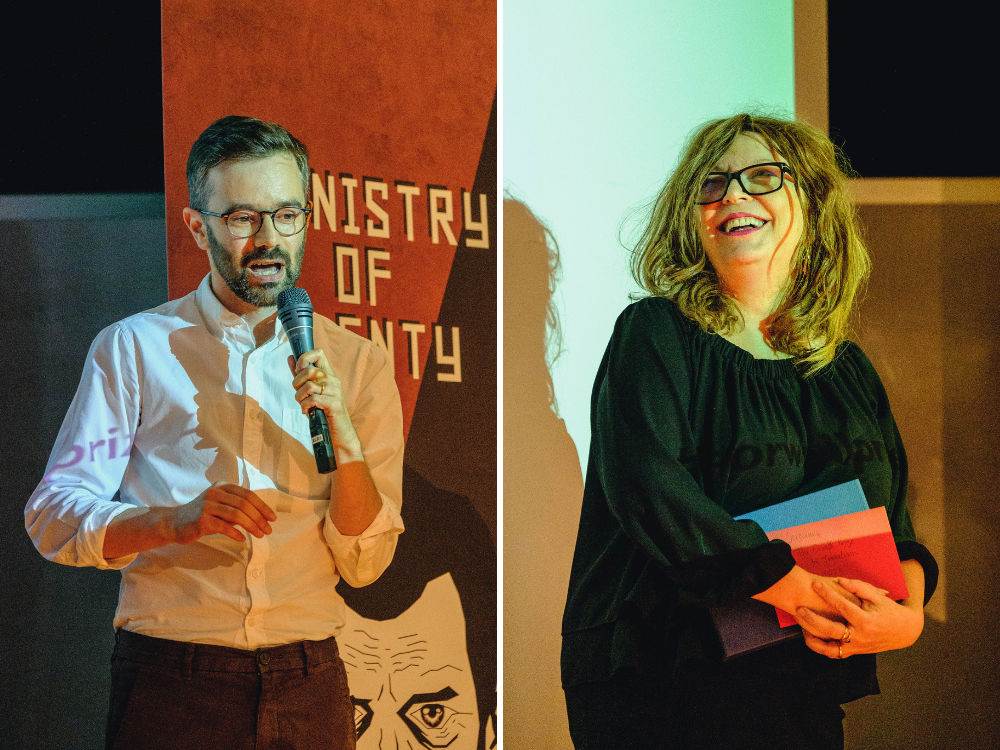
The deputy editor of current affairs magazine Prospect and a Guardian columnist have shared this year’s Orwell Prize for Journalism.
Prospect’s Steve Bloomfield and the Guardian’s Suzanne Moore (both pictured) will split the £3,000 winnings after collecting the prize at its annual ceremony in London last night.
Bloomfield was recognised for his “forensic” work exposing “the Foreign Office’s losing battle to find post-Brexit Britain a place in the world”.
Moore was praised for “brave” op-eds on the Bill Clinton and Monica Lewinsky affair in the wake of #MeToo and the aftermath of the Brexit vote.
Judges said: “The journalism that has won these two prizes represents the best of the Orwell tradition, incisive, relevant and human.
“It also represents the two sides of his journalism: There is Suzanne Moore’s stubborn and brave commentary, and Steve Bloomfield’s forensic research and reporting.”
Bloomfield used time on stage to criticise the “shocking” lack of diversity in the media, particularly regarding class representation.
In an extract of the speech, shared on Twitter, he said: “A free and fearless press is one of the most important aspects of a democracy. But it can only do that job if it reflects the country it is reporting on.
“If all our editors are from the same few schools we are going to miss stories because we don’t know the people affected by them; we are going to miss scandals because we don’t understand that they are scandals; we are going to miss great writers because that’s what representation and diversity actually means.”
Moore made a similar point on stage, saying “we have a crisis of representation”.
Sharing her words on Twitter, Moore said: “We have it at the top: in politics, which is visible, and we have it in the media. Some things have got better, sure, but much hasn’t and that thing is class.
“I doubt now if someone like me could now make it a journalist.”
Their comments followed a report released yesterday by the Sutton Trust which found that that 43 per cent of the UK’s 100 most influential editors and broadcasters went to private school, as did 44 per cent of newspaper columnists.
Also last night, Vice global drugs editor Max Daly picked up the Orwell Prize for Exposing Britain’s Social Evils for his investigation into the links between missing children and the UK drugs trade.
Campbell Robb, chief executive of the Joseph Rowntree Foundation which sponsors the prize, said: “Max Daly’s reporting has brought us the best of journalism – getting under the skin of a difficult issue, giving a voice to people who are not often heard and challenging the assumptions of readers.
“By showing us the reality and the history of the drugs trade in our towns and cities, he has exposed the complex interactions between familiar problems, such as the house crisis, violent crime and poverty.”
Daly tweeted: “It’s a massive honour to get this award, it’s a proper one.
“Up against some fantastic journalism. Thanks to all the young people, youth workers and experts who’ve trusted me and Vice for being the best global platform to amplify unheard voices and hidden stories.”
Observer journalist Carole Cadwalladr won last year’s journalism prize for her investigation into data firm Cambridge Analytica and the impact of data on the 2016 EU referendum.
The Orwell Prize was set up to reward writing that met the legendary writer’s aim to “make political writing into an art”.
Picture: Orwell Foundation
Email pged@pressgazette.co.uk to point out mistakes, provide story tips or send in a letter for publication on our "Letters Page" blog
